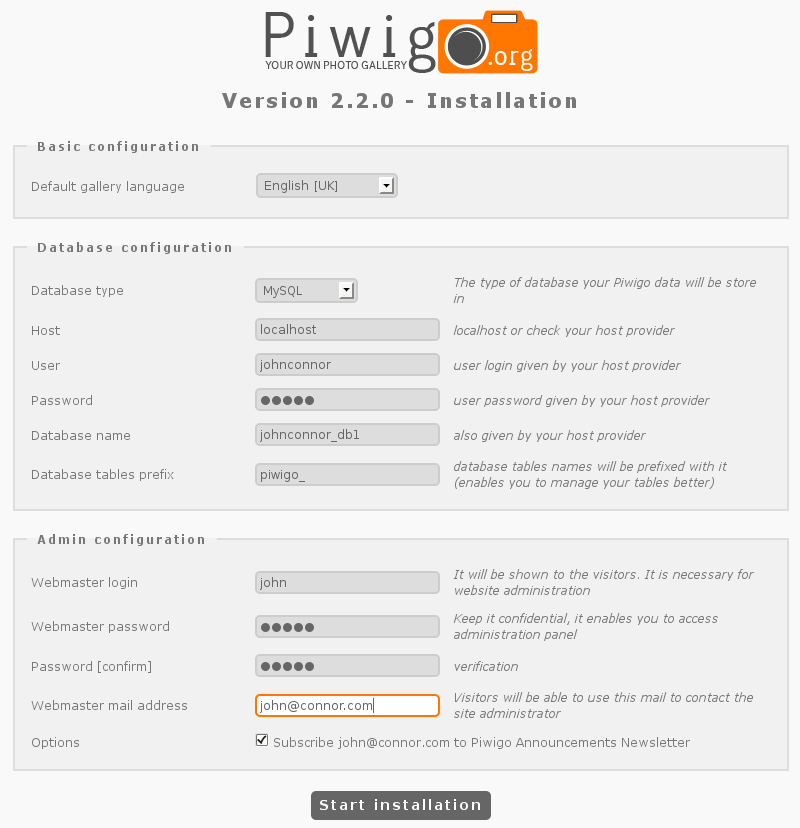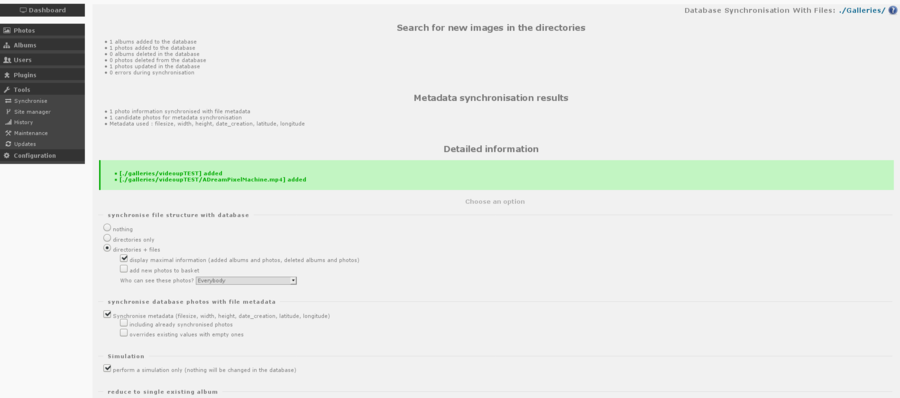Difference between revisions of "Repository"
| (4 intermediate revisions by the same user not shown) | |||
| Line 2: | Line 2: | ||
== vhost config on the host server == | == vhost config on the host server == | ||
repository.conf | repository.conf | ||
<VirtualHost *:80> | <VirtualHost *:80> | ||
ServerAdmin webmaster@localhost | ServerAdmin webmaster@localhost | ||
ServerName repository.anarchaserver.org | ServerName repository.anarchaserver.org | ||
| Line 25: | Line 25: | ||
RewriteEngine on | RewriteEngine on | ||
RewriteCond %{SERVER_NAME} =repository.anarchaserver.org | RewriteCond %{SERVER_NAME} =repository.anarchaserver.org | ||
RewriteRule ^ https://%{SERVER_NAME}%{REQUEST_URI} [END,QSA,R=permanent] | RewriteRule ^ https://%{SERVER_NAME}%{REQUEST_URI} [END,QSA,R=permanent] | ||
</VirtualHost> | </VirtualHost> | ||
repository-le-ssl.conf | repository-le-ssl.conf | ||
<IfModule mod_ssl.c> | <IfModule mod_ssl.c> | ||
<VirtualHost *:443> | <VirtualHost *:443> | ||
ServerAdmin webmaster@localhost | ServerAdmin webmaster@localhost | ||
ServerName repository.anarchaserver.org | ServerName repository.anarchaserver.org | ||
| Line 60: | Line 60: | ||
#RewriteEngine on | #RewriteEngine on | ||
SSLCertificateFile /etc/letsencrypt/live/repository.anarchaserver.org/fullchain.pem | SSLCertificateFile /etc/letsencrypt/live/repository.anarchaserver.org/fullchain.pem | ||
SSLCertificateKeyFile /etc/letsencrypt/live/repository.anarchaserver.org/privkey.pem | SSLCertificateKeyFile /etc/letsencrypt/live/repository.anarchaserver.org/privkey.pem | ||
Include /etc/letsencrypt/options-ssl-apache.conf | Include /etc/letsencrypt/options-ssl-apache.conf | ||
</VirtualHost> | </VirtualHost> | ||
</IfModule> | |||
== Installation of Piwigo == | == Installation of Piwigo == | ||
* https://piwigo.org/get-started | * https://piwigo.org/get-started | ||
| Line 86: | Line 85: | ||
systemctl restart apache2 | systemctl restart apache2 | ||
* Finish the configuration : go to : | * Finish the configuration : go to : | ||
https://repository.anarchaserver.org | https://repository.anarchaserver.org | ||
[[File:Piwigoconfig.png]] | |||
== Installation of Videojs Plug in to allow upload of sound and video == | |||
* https://piwigo.org/ext/extension_view.php?eid=610 | |||
* https://github.com/xbgmsharp/piwigo-videojs | |||
* Documentation wiki https://github.com/xbgmsharp/piwigo-videojs/wiki | |||
To install, activate the File Editor plug-in and follow the instructions here https://github.com/xbgmsharp/piwigo-videojs/wiki/How-to-add-videos | |||
Also mediainfo version does'nt work, you have to replace it by this one https://mediaarea.net/en/MediaInfo/Download/Debian | |||
* Download the 3 packages and : | |||
sudo dpkg -i *deb" | |||
If you get an error message, use: | |||
sudo apt-get -f install | |||
On Debian Stretch, there is a few problem with PHP7 : have to comment a break function in a php file line 185 | |||
=== Batch upload and synchronisation === | |||
There is the possibility to transfer files to a new folder in the galleries folder of piwigo on the server and the synchronise the database so as to include those files. | |||
It can be useful if you want to archive a whole vimeo channel on piwigo, with a ssh shell on the server, you can download the channel with http://rg3.github.io/youtube-dl/ | |||
You have to synchronise the folder and the database with this panel : | |||
[[File:Piwigo-synchro.png|900px]] | |||
---- | |||
= Deprecated > Piwigo instead of Mediagoblin = | = Deprecated > Piwigo instead of Mediagoblin = | ||
Revision as of 17:11, 7 October 2018
Container repository : Piwigo for images, sounds and video
vhost config on the host server
repository.conf
<VirtualHost *:80>
ServerAdmin webmaster@localhost
ServerName repository.anarchaserver.org
ErrorLog ${APACHE_LOG_DIR}/repository-error.log
CustomLog ${APACHE_LOG_DIR}/repository-access.log combined
ProxyPreserveHost On
ProxyRequests Off
ProxyPass / http://10.0.3.4/ ProxyPassReverse http://10.0.3.4/ /
<Proxy *>
Order deny,allow
Allow from all
</Proxy>
RewriteEngine on
RewriteCond %{SERVER_NAME} =repository.anarchaserver.org
RewriteRule ^ https://%{SERVER_NAME}%{REQUEST_URI} [END,QSA,R=permanent]
</VirtualHost>
repository-le-ssl.conf
<IfModule mod_ssl.c>
<VirtualHost *:443>
ServerAdmin webmaster@localhost
ServerName repository.anarchaserver.org
ErrorLog ${APACHE_LOG_DIR}/repository-error.log
CustomLog ${APACHE_LOG_DIR}/repository-access.log combined
ProxyPreserveHost On
ProxyRequests Off
ProxyPass / https://repository.anarchaserver.org/ ProxyPassReverse / https://repository.anarchaserver.org/
<Proxy *>
Order deny,allow
Allow from all
</Proxy>
SSLEngine on
SSLProxyEngine On
SSLProxyVerify none
SSLProxyCheckPeerCN off
SSLProxyCheckPeerName off
SSLProxyCheckPeerExpire off
#RewriteEngine on SSLCertificateFile /etc/letsencrypt/live/repository.anarchaserver.org/fullchain.pem SSLCertificateKeyFile /etc/letsencrypt/live/repository.anarchaserver.org/privkey.pem Include /etc/letsencrypt/options-ssl-apache.conf </VirtualHost> </IfModule>
Installation of Piwigo
sudo apt install iputils-ping nano apache2 php-xml php-mbstring mysql-server php7.0 php7.0-gd imagemagick exiftool wget unzip php7.0-mysql apt-utils locate
- Get Piwigo
cd /tmp wget https://piwigo.org/download/dlcounter.php?code=latest unzip dlcounter.php\?code\=latest unzip /tmp/dlcounter.php\?code\=latest . mv piwigo/* /var/www/html/
- Create a mysql user
mysql -u root
- Activate ssl on the container
a2enmod ssl ln -s /etc/apache2/sites-available/default-ssl.conf /etc/apache2/sites-enable/default-ssl.conf systemctl restart apache2
- Finish the configuration : go to :
https://repository.anarchaserver.org
Installation of Videojs Plug in to allow upload of sound and video
- https://piwigo.org/ext/extension_view.php?eid=610
- https://github.com/xbgmsharp/piwigo-videojs
- Documentation wiki https://github.com/xbgmsharp/piwigo-videojs/wiki
To install, activate the File Editor plug-in and follow the instructions here https://github.com/xbgmsharp/piwigo-videojs/wiki/How-to-add-videos
Also mediainfo version does'nt work, you have to replace it by this one https://mediaarea.net/en/MediaInfo/Download/Debian
- Download the 3 packages and :
sudo dpkg -i *deb"
If you get an error message, use:
sudo apt-get -f install
On Debian Stretch, there is a few problem with PHP7 : have to comment a break function in a php file line 185
Batch upload and synchronisation
There is the possibility to transfer files to a new folder in the galleries folder of piwigo on the server and the synchronise the database so as to include those files.
It can be useful if you want to archive a whole vimeo channel on piwigo, with a ssh shell on the server, you can download the channel with http://rg3.github.io/youtube-dl/
You have to synchronise the folder and the database with this panel :
Deprecated > Piwigo instead of Mediagoblin
Installation of Mediagoblin
Connect to the container :
sudo lxc-attach -n repository
Installation of the dependencies
On debian Strech, nmp doesn't seem to be in the repository, so to install (http://linuxbsdos.com/2017/06/26/how-to-install-node-js-lts-on-debian-9-stretch/) :
apt install curl curl -sL https://deb.nodesource.com/setup_6.x | bash - apt install nodejs node --version v6.11.2 apt install build-essential libssl-dev npm version
Puis on installe les dépendances :
apt-get install git-core python python-dev python-lxml python-imaging python-virtualenv automake nginx
Installation of Postgresql
apt-get install postgresql postgresql-client python-psycopg2
Configure Postgresql
loggin as postgresql
su - postgres
the as postgresql user :
createuser -A -D mediagoblin createdb -E UNICODE -O mediagoblin mediagoblin exit
Now, as root, create a mediagoblin user
useradd -c "GNU MediaGoblin system account" -d /var/lib/mediagoblin -m -r -g www-data mediagoblin groupadd mediagoblin && sudo usermod --append -G mediagoblin mediagoblin
Create a mediagobling directory and install it in a virtual env
mkdir -p /srv/repository.anarchaserver.org && chown -hR mediagoblin:www-data /srv/&& chown -hR mediagoblin:www-data /srv/repository.anarchaserver.org
su mediagoblin -s /bin/bash cd /srv/repository.anarchaserver.org/ git clone git://git.savannah.gnu.org/mediagoblin.git -b stable cd mediagoblin/ git submodule init && git submodule update
Set up the hacking env
./bootstrap.sh && ./configure && make mkdir user_dev && chmod 750 user_dev ./bin/easy_install flup==1.0.3.dev-20110405
This concludes the initial configuration of the MediaGoblin environment. In the future, when you update your codebase, you should also run:
$ git submodule update && ./bin/python setup.py develop --upgrade && ./bin/gmg dbupdate
Note: If you are running an active site, depending on your server configuration, you may need to stop it first or the dbupdate command may hang (and it’s certainly a good idea to restart it after the update)
Deploy MediaGoblin Services
cp -av mediagoblin.ini mediagoblin_local.ini && cp -av paste.ini paste_local.ini
Then edit mediagoblin_local.ini:
- Set email_sender_address to the address you wish to be used as the sender for system-generated emails
- Edit direct_remote_path, base_dir, and base_url if your mediagoblin directory is not the root directory of your vhost.
- Uncomment sql_engine = postgresql:///mediagoblin
it gives :
[mediagoblin]
#direct_remote_path = /mediagoblin/
direct_remote_path = /mgoblin_static/
email_sender_address = "anarchaserver@autistiche.org"
## Uncomment and change to your DB's appropiate setting.
## Default is a local sqlite db "mediagoblin.db".
## Don't forget to run `./bin/gmg dbupdate` after having changed it.
sql_engine = postgresql:///mediagoblin
...
# Place plugins here, each in their own subsection of [plugins].
# See http://docs.mediagoblin.org/siteadmin/plugins.html for details.
[plugins]
mediagoblin.plugins.geolocation
mediagoblin.plugins.basic_auth
mediagoblin.plugins.processing_info
mediagoblin.media_types.image
mediagoblin.media_types.video
mediagoblin.media_types.audio
Before you start using the database, you need to run:
./bin/gmg dbupdate
Add Audio and video support in mediagoblin
Video
apt-get install python-gi python3-gi gstreamer1.0-tools gir1.2-gstreamer-1.0 gir1.2-gst-plugins-base-1.0 gstreamer1.0-plugins-good gstreamer1.0-plugins-ugly gstreamer1.0-plugins-bad gstreamer1.0-libav python-gst-1.0
And add the mediagoblin.media_types.video in mediagoblin_local.ini as below
Audio
apt-get install python-gst-1.0 gstreamer1.0-plugins-{base,bad,good,ugly} gstreamer1.0-libav python-numpy python-scipy libsndfile1-dev libasound2-dev
And add the mediagoblin.media_types.audio in mediagoblin_local.ini as below
Update the database to include video and audio
in /srv/repository.anarchaserver.org/mediagoblin/ as mediagoblin user :
./bin/gmg dbupdate
=== Configure N GINX and FastCGI ===
nano /srv/repository.anarchaserver.org/nginx.conf
see the example file : http://mediagoblin.readthedocs.io/en/stable/siteadmin/deploying.html#fastcgi-and-nginx
Create a symlink :
ln -s /srv/repository.anarchaserver.org/nginx.conf /etc/nginx/sites-enabled/
Restart NGINX
systemctl restart nginx
Start the server
cd /srv/repository.anarchaserver.org/mediagoblin/ su mediagoblin -s /bin/bash ./lazyserver.sh --server-name=fcgi fcgi_host=127.0.0.1 fcgi_port=26543

